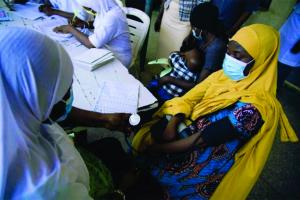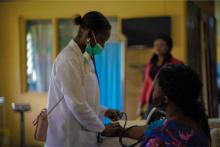States replicate successful low-cost hypertension solution model in over 80 PHC centres
Abuja, 26 August, 2022 - When 38-year-old man Mr Hassan Olusoji, residing at Ijebu Ode, Ogun State, was diagnosed with high blood pressure (HBP) at a Primary Health Care Centre (PHC), in Italapo, in same state, he was surprised, he never expected to have the disease.
“I never thought I had high blood pressure because I believed it’s a disease associated with the elderly. On getting to the PHC, I was diagnosed with HBP and was placed on treatment.
I get my medication from the PHC at a subsidized price, and this makes it easier for me to manage my condition at every visit, my blood pressure is checked, I receive counselling on what to eat, things to do and stop doing,” he said.
Mr Olusoji had gone seeking medical attention at the PHC because he was experiencing periodic headaches, difficulty in breathing and feeling tired frequently after walking a short distance.
Hypertension is a major risk factor for cardiovascular disease globally and a leading cause of premature death for persons with Noncommunicable Diseases. However, low and middle-income countries bear a great deal of this burden.
In Nigeria, an estimated 1 in 3 adults is hypertensive. Termed a silent killer, almost half of the population with the disease are not aware of this condition.
Positive signs
In a bid to curb the mortality rate of the disease in Nigeria, the Federal Ministry of Health (FMOH), in collaboration with the World Health Organization (WHO) and the National Primary Healthcare Development Agency (NPHCDA) with funding from Resolve to Save Lives (RTSL), rolled out the National Hypertension Control Initiative (NHCI). The initiative aims at strengthening the health system for the prevention and control of hypertension at the lower levels of care.
The initiative provides hypertension screening services, enrollment to care and offers treatment to persons who fall within the treatment criteria.
Since its launch in November 2020, a total of 22,753 persons have been diagnosed and 16,445 enrolled on care. There are currently 104 PHC facilities offering this service in both Kano and Ogun states.
Saving lives
Dr Seyi Adu, the Non-Communicable Disease (NCDs) Coordinator in Ogun state, attributed the the positive outcome to extensive community screening in rural communities.
The health facilities conduct community outreaches within their respective catchment areas, especially at public places such as Churches, Mosques, and community festivals, including commemorations of Health Days. With this strategy alone, the teams screened over 5000 people and those with elevated blood pressure are subsequently connected to the NHCI implementing facilities nearest to them.
Likewise, Dr Sharif Yahaya Musa, the DMS- Kano State PHC Development Board (SPHCDB), ascribed the success in the state to the supportive supervision and clinical mentoring of the project in the implementing 52 PHCs.
“In Kano, we started with 12 PHCs, with additional 40 health facilities added for hypertension diagnosis and treatment and conducted training for 80 healthcare workers on NHCI activities.
We also trained 52 PHCs District Health Information Systems (DHIS) to document the data generated at the health facilities where the initiative is implemented”, he said.
Partnership for success
Uncontrolled blood pressure is one of the main risk factors for cardiovascular diseases (CVDs), such as heart attacks and stroke and globally it is the most common cause of death and disease.
Although Nigeria has no current hypertension prevalence data, a similar systematic review with a meta-analysis conducted by the FMOH in collaboration with WHO in 2018 put the prevalence rate of hypertension at 31.2% and hypertensive heart disease at 27% in the country.
The Director of Public Health Department FMOH, Dr Alex Okoh, appreciating the WHO and RTSL at a recent NHCI review meeting said, “ we are indeed proud of the tremendous progress we have made so far and have now commenced the scaling up of the project in both states from the initial 12 PHC centres per state to 80 PHC centres per state.”
He said the strengthening of the PHC is in tandem with the National Multi-Sectoral Action Plan for the Prevention and Control of Non-Communicable Diseases (2019 – 2025) which has various targets, one of which is to achieve at least 25% relative reduction in the prevalence of raised blood pressure in the country.
Meanwhile, the Director, Global Hypertension Control, at Resolve to Save Lives, Dr Andrew Moran, was optimistic about the success, as he said since it was launched in 2020, over 14 000 people with hypertension under the initiative.
He said lots of the PHCs in Nigeria have no services for NCDs and therefore, the initiative serves as an entry point to build the health system toward NCDs.We hope that this serves as a model for scaling up to other states in the country.
Furthermore, the WHO Country Representative, Dr Walter Kazadi Mulombo noted that this initiative is a laudable one as it has and will pave way for other interventions, especially at the lower levels of care. WHO supported the development of the 2019-2025 National NCDs Multisectoral Action Plan which provides the road map for the country toward the prevention and control of NCDs.
Modifiable factors for the prevention of hypertension include reduction of salt intake, being physically active, stop tobacco use, reducing alcohol consumption, and increasing intake of fruits and vegetables.
Technical Contact:
Dr Mary Dewan; Email: dewanm [at] who.int (dewanm[at]who[dot]int)

